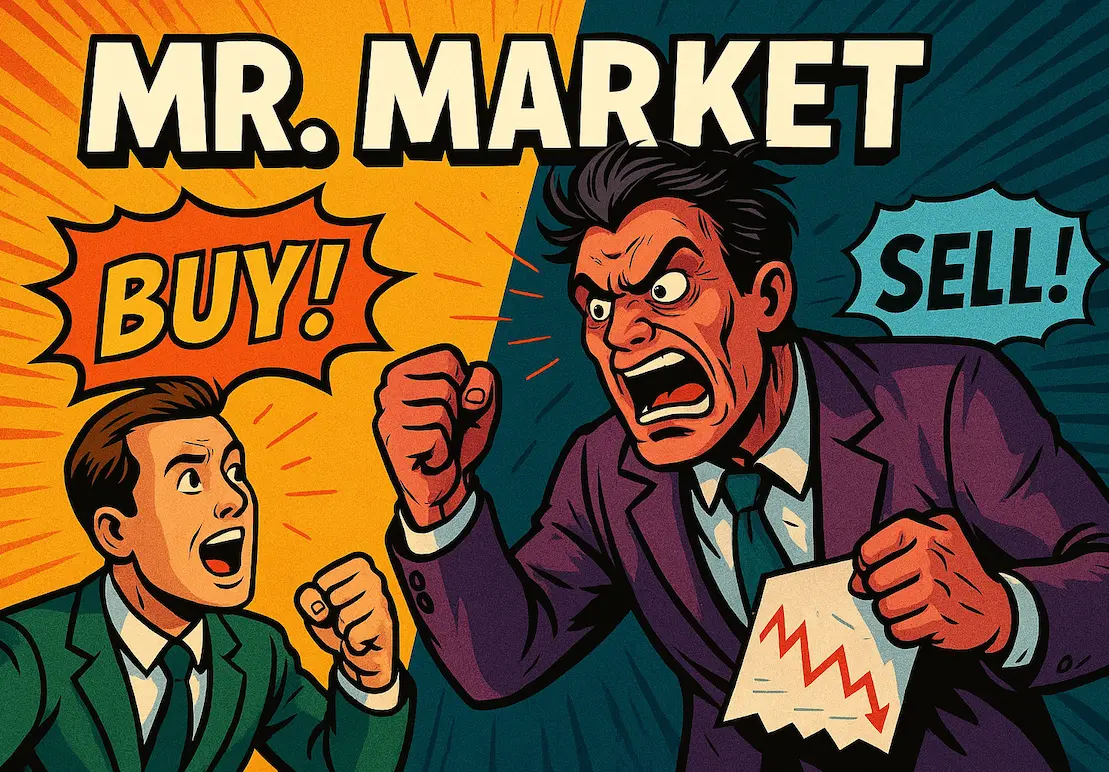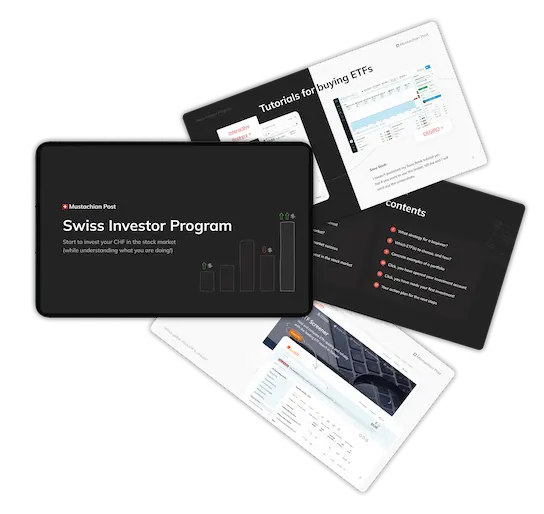For several years now, I have been receiving emails from novice investors who want to be reassured before taking action on the stock market.
These emails are more and more numerous with the current coronavirus crash on the stock market, because some see it as an opportunity to start.
As I answer each time the same thing to these emails, I told myself that I was going to make it an article to which I could redirect future requests.
I also specify here that I am not going to go into details about what is the stock market, shares, etc. I’m saving that for my Swiss Investor Program which is now available:
Also, just so I don’t look like a financial advisor (reminder: read the “Disclaimer” section at the bottom of the page), I’m going to pretend that I’m starting to invest myself today, and that I’m writing to that famous MP. At worst, I will file a complaint against myself :P
Hi MP,
I’ve been reading your blog and other resources on the net for several months now in order to begin investing on the stock exchange. I’m going to start with CHF 10'000 and then I’ll put a monthly amount between CHF 500 and CHF 1'500 depending on the period.
What would you do if you started today, but with all the knowledge you’ve acquired since 2014?
Thank you for your time,
Marc Pittet
My answer to such emails is a list of questions to make sure that the person has the same mindset as me, as well as a similar investor profile:
- Are you willing to leave your money invested in the stock market untouched for 10-15+ years?
- Are you around 7-10 on a risk scale of 1-10 (1 = I’m afraid of losing even CHF 5, and 10 = I’m strong enough not to sell anything even if my portfolio is at -50% lows during crises)?
- Do you only want to spend a maximum of 15-30 minutes per quarter on your investments?
- Do you have a safety reserve in cash that will allow you not to sell a stock market investment in case of a hard blow?
- Are you going to invest several thousand francs of initial capital and then several hundred or even thousands of francs per month or quarter?
- Are you between 20 and 40 years old?
“Yes to all your questions!” Marc Pittet answered me.
If you too, dear reader, answer “Yes!” to all these questions, then you can continue your reading because my long-term investment method may suit you.
If you have answered “No” to any question, then I recommend that you do not continue reading as you may take more risks with your savings than you are able to bear.
Simple and effective stock market investment strategy
The strategy recommendation to today’s “Marc Pittet” would be a portfolio of index ETFs. This means passive fund management, to pay the least amount of fees, and more importantly because historically it beats 75%+ of actively managed funds.
In particular, I would recommend myself a portfolio with three ETFs, “Boglehead” style:
- 1 global index ETF up to 55% (to take advantage of the overall performance of the markets)
- 1 Swiss index ETF up to 15% (to keep part of my capital in the currency where I live)
- 1 bond ETF up to 30%, or even less if you want to be aggressive until your 35-40 years old (to protect part of my capital from the high volatility of stocks)
I consider my 2nd pillar as a “bond” (because it is more or less secure, at least more than shares normally) as part of my net assets. So historically I have never invested in bonds at the moment.
If you’re in your early twenties and you don’t have any money on your BVG, I would say that it’s not a big deal and would recommend you to put everything in shares because you can afford to be more aggressive during your 20-30ies (remember, this is just the opinion of a guy on the internet!).
Concretely, that means I would invest my CHF 10'000 like this:
- CHF 8'000 in the global VT ETF that you can buy in USD (if I use Interactive Brokers, see below), or in the VWRL global ETF which can be bought in EUR or CHF (if you use DEGIRO or Saxo Bank)
- CHF 2'000 in the Swiss ETF “UBS ETF (CH) SMIM (CHF) A-dis” which follows the SMIM index consisting of the 30 medium sized Swiss companies (because I don’t want big companies like Nestlé which are already in my global ETF)

My very concrete example of a portfolio in the middle of a coronavirus crisis, just to make sure we agree on what are the variations we should be able to withstand :)
UPDATE 03.11.2025: I recently adjusted my investment strategy, so I recommend reading this alongside: => “Why I’m switching from Bogleheads to 100% stocks”.
“What if we are in a coronavirus (or Trump tariffs) crisis or a bull market?”
The question that often comes next, regardless of the type of market (rising or falling), is:
“Hey but MP, the market’s gonna crash, I hear it everywhere, it can’t go up like that for much longer. What would you do if you were me?” Marc Pittet wrote to me in 2017.
Or again:
“Hey MP, I told you, it’s 2020, and the famous coronavirus stock market crash is here, I’m hesitate to get in now. Or wait a little longer to enter when it’s at the bottom of the hole? What would you do?”
My answer is always the same whether we’re in a bull market in 2019, or a coronavirus crash in 2020 (or subprime mortgages crisis in 2008-2009, or the dotcom bubble crash in 2000-2001): you can’t predict the future. So you can’t beat the market. So your most precious ally is time. So, start now! And don’t get out.
That’s the best way to be successful in the stock market in the long run, and all the empirical financial studies prove it.
“What about real estate, P2P loans, gold, oil, cryptocurrencies, and value investing?”
Now, you’re gonna have to trust me until my epic guide for the beginner swiss investor comes out.
In the meantime, the answer to your question is that everything you’ve listed is:
- Either too risky
- Either it’s too time consuming
- Either it’s not necessary for a successful portfolio
“What if I have CHF 50'000, or even CHF 100'000, I put in all at once?”
Regarding the strategy of dividing the amount into three index funds, yes I would do the same regardless of the amount to invest.
As for whether to put all at once or not, there are several schools. Some advise to spread the investment over several months so as not to get in at the worst moment and smooth the whole thing out. Others say that in the long run it doesn’t make much difference.
If I had CHF 100'000 to invest today, I think I would follow the “rule” of 10% over 10 months. This is to avoid procrastinating too much about when the crisis or bull market will end.
“OK, I want to start now. Which online broker do I choose?”
“I saw that Swissquote had a great advertising these days, they seem to rock! Would you choose that too?”, Marc Pittet asked me.
Ah, marketing bullsh**…
To make a long story short, my online broker recommandation to date is very simple (all the details to come in an upcoming “Best of Online Broker 2020 for a Swiss investor”):
- Interactive Brokers is the best online broker for Swiss investors
- Choose DEGIRO if you prefer a broker based in Europe rather than the U.S.
- And if you absolutely want a Swiss-based online broker, then choose Saxo Bank (<= CHF 200 brokerage fee refunded using this link)
What are you waiting for to get started?
“MP, I’m still scared to death of the stock market. Can’t you please take me by the hand?”
I received this feedback many times after publishing this article. That’s why I decided to create my first (paid) online program.
It’s for you if you’re a complete beginner who wants to start investing in the stock market. And above all, by understanding 100% what you are doing!
All information about this 100% Swiss program made by a Swiss can be found here:
PS: If you are a seasoned investor, don’t hesitate to explain via the comments’ section below the investment strategy you’d share with those around you (family, friends, etc.) as I just did. I’m sure we all have a lot to learn from each other.
PS bis: for financial compliance reasons, please note that investing involves risk of loss.
Why I'm switching from Bogleheads to 100% stocks
Investing yourself vs. robo-advisor: which is best...





Last updated: November 3, 2025